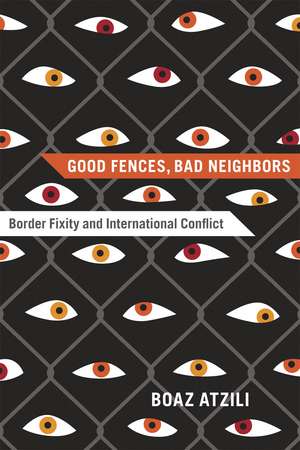Good Fences, Bad Neighbors: Border Fixity and International Conflict
Autor Boaz Atzilien Limba Engleză Paperback – feb 2012
Border fixity—the proscription of foreign conquest and the annexation of homeland territory—has, since World War II, become a powerful norm in world politics. This development has been said to increase stability and peace in international relations. Yet, in a world in which it is unacceptable to challenge international borders by force, sociopolitically weak states remain a significant source of widespread conflict, war, and instability.
In this book, Boaz Atzili argues that the process of state building has long been influenced by external territorial pressures and competition, with the absence of border fixity contributing to the evolution of strong states—and its presence to the survival of weak ones. What results from this norm, he argues, are conditions that make internal conflict and the spillover of interstate war more likely. Using a comparison of historical and contemporary case studies, Atzili sheds light on the relationship between state weakness and conflict. His argument that under some circumstances an international norm that was established to preserve the peace may actually create conditions that are ripe for war is sure to generate debate and shed light on the dynamics of continuing conflict in the twenty-first century.
In this book, Boaz Atzili argues that the process of state building has long been influenced by external territorial pressures and competition, with the absence of border fixity contributing to the evolution of strong states—and its presence to the survival of weak ones. What results from this norm, he argues, are conditions that make internal conflict and the spillover of interstate war more likely. Using a comparison of historical and contemporary case studies, Atzili sheds light on the relationship between state weakness and conflict. His argument that under some circumstances an international norm that was established to preserve the peace may actually create conditions that are ripe for war is sure to generate debate and shed light on the dynamics of continuing conflict in the twenty-first century.
Preț: 210.77 lei
Preț vechi: 250.60 lei
-16% Nou
Puncte Express: 316
Preț estimativ în valută:
40.33€ • 41.86$ • 33.71£
40.33€ • 41.86$ • 33.71£
Carte indisponibilă temporar
Doresc să fiu notificat când acest titlu va fi disponibil:
Se trimite...
Preluare comenzi: 021 569.72.76
Specificații
ISBN-13: 9780226031361
ISBN-10: 0226031365
Pagini: 296
Ilustrații: 2 halftones, 5 line drawings, 5 tables
Dimensiuni: 152 x 229 x 18 mm
Greutate: 0.4 kg
Ediția:New.
Editura: University of Chicago Press
Colecția University of Chicago Press
ISBN-10: 0226031365
Pagini: 296
Ilustrații: 2 halftones, 5 line drawings, 5 tables
Dimensiuni: 152 x 229 x 18 mm
Greutate: 0.4 kg
Ediția:New.
Editura: University of Chicago Press
Colecția University of Chicago Press
Notă biografică
Boaz Atzili is assistant professor in the School of International Service, American University.
Cuprins
List of Figures
List of Tables
Preface and Acknowledgments
Introduction
1 ∙ The Theory and Practice of Borders
2 ∙ Which Wars Make the State and Which States Make War
3 ∙ Preconditions to State Building: Making the Case for Comparison
4 ∙ State Building and State Weakness before Border Fixity: Brandenburg-Prussia, Argentina, and Poland-Lithuania
5 ∙ State Building and State Failure in a Fixed-Borders World: Lebanon, Congo, and Israel
6 ∙ State Weakness and International Conflict in a Fixed-Borders World
7 ∙ Conclusions
Notes
Bibliography
Index
List of Tables
Preface and Acknowledgments
Introduction
1 ∙ The Theory and Practice of Borders
2 ∙ Which Wars Make the State and Which States Make War
3 ∙ Preconditions to State Building: Making the Case for Comparison
4 ∙ State Building and State Weakness before Border Fixity: Brandenburg-Prussia, Argentina, and Poland-Lithuania
5 ∙ State Building and State Failure in a Fixed-Borders World: Lebanon, Congo, and Israel
6 ∙ State Weakness and International Conflict in a Fixed-Borders World
7 ∙ Conclusions
Notes
Bibliography
Index
Recenzii
“Atzili sheds powerful light on the roots of current international and civil conflicts. His arguments are novel and convincing. This book is essential reading for students of international politics and policy.”
“Boaz Atzili presents a very interesting, well-researched, and counterintuitive argument that carries important policy implications and should be emphasized in the literature about international security.”
“Good Fences, Bad Neighbors addresses in a very illuminating and novel way one of the key paradoxes in post–World War II international security: how and why an international norm designed to encourage peace increased, rather than decreased, the level of warfare in at least some parts of the world. Boaz Atzili provides an original and insightful analysis of why in the current international system the weakest states generate the most instances of war.”
"The international norm of border fixity (or the idea that the forcible annexation of territory is taboo) is thought to contribute to international stability, but Boaz Atzili argues that in some cases it contributes to the survival of weak states, thus creating conditions that make war more likely."
